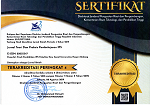Using learning technology for social studies as a resilient media during the pandemic outbreak
Abstract
The covid-19 pandemic has almost been experienced in all corners of the world in the last two years. The impact is no exception and also affects the activities of students, workers, or the community in general. However, the existing obstacles do not make humans surrender to that conditions. In fact, with these conditions make everyone compete in creating innovations to support learning activities. This study explores student resilience efforts in dealing with the covid-19 pandemic through learning media as a supporting application in online learning. A conventional literature review was used to elaborate on the research problem. This study found that using learning technology media can make people's and students’ lives resilient during the Covid-19 pandemic. Students found themselves more flexible and encouraged to participate in learning processes. As a result, they could learn effectively in social studies materials provided on the online platform.
Keywords
Full Text:
PDFReferences
Alami, Y. (2020). Media pembelajaran daring pada masa covid-19. Tarbiyatu Wa Ta’lim: Jurnal Pendidikan Agama Islam, 2(1), 49–56.
Buana, D. R. (2020). Analisis Perilaku Masyarakat Indonesia dalam Menghadapi Pandemi Virus Corona (Covid-19) dan Kiat Menjaga Kesejahteraan Jiwa. SALAM: Jurnal Sosial Dan Budaya Syar-i, 7(3), 217–226. https://doi.org/10.15408/sjsbs.v7i3.15082
Bustanil, M. S., & Tri Ardianto, D. (2019). Pengembangan Media Pembelajaran Interaktif Berbasis Video Tutorial Di Sekolah Menengah Kejuruan. JTP-Jurnal Teknologi Pendidikan, 21(2), 119–134. http://journal.unj.ac.id/unj/index.php/jtp
Darmalaksana, W. (2020). Metode penelitian kualitatif studi pustaka dan studi lapangan. Pre-Print Digital Library UIN Sunan Gunung Djati Bandung.
Djalante, R., Lassa, J., Setiamarga, D., Sudjatma, A., Indrawan, M., Haryanto, B., Mahfud, C., Sinapoy, M. S., Djalante, S., Rafliana, I., Gunawan, L. A., Surtiari, G. A. K., & Warsilah, H. (2020). Review and analysis of current responses to COVID-19 in Indonesia: Period of January to March 2020. Progress in Disaster Science, 6. https://doi.org/10.1016/j.pdisas.2020.100091
Dong, C., Cao, S., & Li, H. (2020). Young children's online learning during COVID-19 pandemic: Chinese parents' beliefs and attitudes. Children and Youth Services Review, 118. https://doi.org/10.1016/j.childyouth.2020.105440
Efendy, R., Ramli, N., Rismal, A. M., & Tasbi, A. (2020). New Reality sebagai Akibat Pandemi Global dan Tantangan di Era New Normal. In Kesiapan Dunia Pendidikan Menghadapi Era New Normal (Ragam Perspektif Praktisi Pendidikan) (pp. 63–80). IAIN PAREPARE Nusantara Press.
Joyosemito, Susanto, ibnu, & Nasir, N. M. (2021). Gelombang kedua pandemi menuju endemi covid-19: Analisis kebijakan vaksinasi dan pembatasan kegiatan masyarakat di Indonesia. Jurnal Sains Teknologi Dalam Pemberdayaan Masyarakat, 2(1), 55–66.
Khusniyah, T. W. (2020). Efektivitas E-Learning Terhadap Hasil Belajar Mahasiswa Pada Mata Kuliah Konsep Dasar IPS. SAP (Susunan Artikel Pendidikan), 4(3), 207–214. https://doi.org/10.30998/SAP.V4I3.6283
Kurniati, E., Alfaeni, D. K. N., & Andriani, F. (2020). Analisis peran orang tua dalam mendampingi anak di masa pandemi covid-19. Jurnal Obsesi: Jurnal Pendidikan Anak Usia Dini, 5(1), 241–256.
Mu’ayyadah, M., & Fatmawati, N. (2021). Pemanfaatan Teknologi Sebagai Pembelajaran E-Learning Google Classroom Pada Mata Pelajaran IPS. ASANKA : Journal of Social Science and Education, 2(1), 31–42. https://doi.org/10.21154/ASANKA.V2I1.2364
Nurgiansah, T. H. (2021). Pemanfaatan E-Learning dalam Pembelajaran Pendidikan Kewarganegaraan. JINTECH: Journal of Information Technology, 2(2), 138–146. https://journal.ar-raniry.ac.id/index.php/jintech
Puspitasari, I. M., Yusuf, L., Sinuraya, R. K., Abdulah, R., & Koyama, H. (2020). Knowledge, Attitude, and Practice During the COVID-19 Pandemic: A Review. Journal of Multidisciplinary Healthcare, 13(1), 727–733. https://doi.org/10.2147/JMDH.S265527
Rutter, M. (2006). Implications of resilience concepts for scientific understanding. Annals of the New York Academy of Sciences, 1094(1), 1–12.
Suriadi, H. J., Firman, F., & Ahmad, R. (2021). Analisis Problema Pembelajaran Daring Terhadap Pendidikan Karakter Peserta Didik. Edukatif: Jurnal Ilmu Pendidikan, 3(1), 165–173. https://doi.org/10.31004/EDUKATIF.V3I1.251
Triandini, E., Jayanatha, S., Indrawan, A., Putra, G. W., & Iswara, B. (2019). Metode systematic literature review untuk identifikasi platform dan metode pengembangan sistem informasi di Indonesia. Indonesian Journal of Information Systems, 1(2), 63–77.
Ulfah, E., Bakhtiar, B., & Irma, H. T. (2018). Resiliensi Wanita Penderita Kanker Payudara Stadium Lanjut. Al-Qalb : Jurnal Psikologi Islam, 9(2), 119–129. https://doi.org/10.15548/ALQALB.V9I2.860
Wahyono, P., Husamah, H., & Budi, A. S. (2020). Guru Profesional di Masa Pandemi COVID-19: Review implementasi, Tantangan, dan Solusi Pembelajaran Daring. Jurnal Pendidikan Profesi Guru, 1(1), 51–65. https://doi.org/10.22219/JPPG.V1I1.12462
Yuliana, Y. (2020). Corona virus diseases (Covid-19): Sebuah tinjauan literatur. Wellness and Healthy Magazine, 2(1), 187–192.
DOI: http://dx.doi.org/10.17977/um022v8i12023p40
Refbacks
- There are currently no refbacks.
Editorial and Administration Office:
This Journal is published by Prodi Pendidikan IPS, Fakultas Ilmu Sosial, Universitas Negeri Malang
Semarang St. No. 5 Building I3-102 65145.
Phone. (0341) 551312. line. 376 (19)
Homepage: http://journal2.um.ac.id/index.php/jtppips/index
email: jtp2ips.journal@um.ac.id
JTP2IPS INDEXED BY:
e-ISSN 2503-5347
ISSN 2503-1201
JTP2IPS is licensed by CC BY 4.0.










